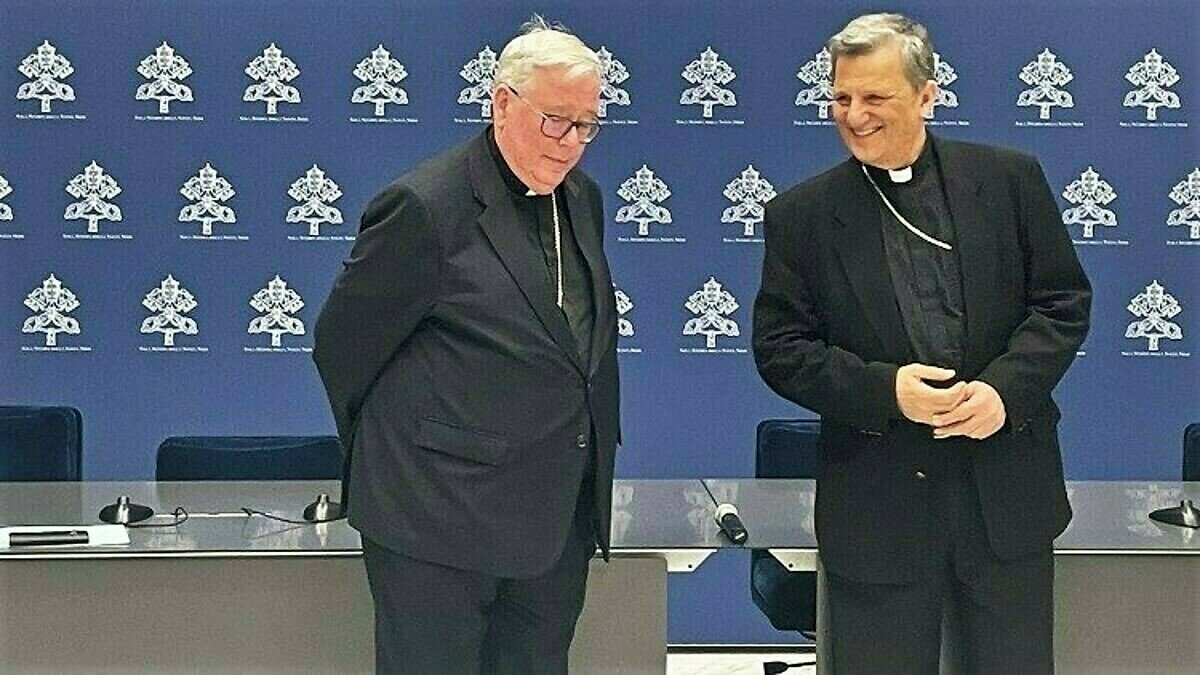Barb Dowding offered only a modest “Oh, how wonderful would that be?” when asked about the possibility she could be one of the lay people who will serve as full members of the Synod of Bishops.
She then quickly added, “I doubt it, though. So many people could fit that role.”
The former Archdiocese of Vancouver chancellor and special assistant to Archbishop J. Michael Miller is part of the North American Synod Writing Team that produced the final document for North America’s contribution to the 2021-to-2024 synod.
Although the changes to the Synod of Bishops introduced Wednesday by Pope Francis to allow lay people, including women, to enjoy voting rights at the assembly are of interest to Dowding, she’s more passionate about the final document’s emphasis on baptismal calling and dignity in a more synodal Church as an opportunity to repair damaged trust.
“It was very strong. It came from the rank and file, basically …. If people in general love the Church and understand what it’s supposed to be, then there’s hope going forward for all of the baptized.”
The synod assembly composition changes Pope Francis will seal the synodal path he himself launched in Autumn 2021 and are part of a broader series of changes to the rules governing participation at synods.
The changes were presented by Cardinal Mario Grech, Secretary General of the Secretariat for the Synod, and Cardinal Jean-Claude Hollerich, the Synod’s General Relator.

“This is not a revolution but an important change,” they said at a press conference at the Holy See Press Office.
The new arrangements were released in a letter that states no current regulations have been repealed and that the 2018 Apostolic Constitution Episcopalis Communio already provided for the presence of “non-bishops” at the Synod.
The 70 non-bishop members will be chosen by the Pope from a list of 140 prepared by the 7 International Reunions of Bishops’ Conferences and the Assembly of Patriarchs of Eastern Catholic Churches.
They shall represent “various groupings of the faithful of the people of God (priests, consecrated women, deacons, lay faithful),” according to the letter.
The choice of the 140 candidates, the cardinals said, shall take into account each person’s general culture, prudence, knowledge, and participation in the synodal process. As members, they have the right to vote.
This aspect is important, noted Cardinal Grech, adding that he hopes someday “we will be able to do without the vote, since the synod is a discernment, a prayer.”
Meanwhile, the final document for North America’s contribution to the 2021-to-2024 synod was released April 12 and elaborated three key themes that emerged from the continent-wide consultation: Called and Gifted through baptism; Communion with Christ and One Another; and Sent Forth on Mission.
The first emphasizes the centrality of our common baptismal calling and dignity as the foundation of synodality and calls for a deeper recognition of that dignity along with opportunities for co-responsibility in the Church and her mission.
The theme of Communion with Christ and One Another acknowledges the deep divisions present within the Church and looks for ways to strengthen unity among members of the Body of Christ.
Finally, the third theme, Sent Forth on Mission, recognizes the duty of all the baptized to go on mission to the peripheries to proclaim the Good News of the Gospel, especially to those on the margins of society and of the Church.

Within the context of those main themes, the document also highlighted issues raised by the faithful, including the role of women and young people in the Church; the crisis of trust and credibility, especially in light of the ongoing abuse crisis; the importance of inclusivity; notably with regard to the LGBTQ community; the relationship of the Church to the modern world; and the need for formation in synodality and discernment, in mission, and in Catholic social teaching.
The final document also presents the reflections of the bishops on the experience of synodality in North America.
In their collegial rereading of the “lived synodal experience,” the bishops described their experience of the diocesan process as “a great grace,” and expressed a desire to find ways to continue and deepen the practice of synodality.
As a result of their collective discernment, the bishops proposed five “priorities” for further discussion by the synod when it meets in Rome in October: the integration of the synodal consultation of the local Churches, including formation in synodality and the spirituality of discernment; the challenge of welcoming those who feel excluded; co-responsibility in the Church; unity and communion in the Church amidst various kinds of polarization and division; and the need for a Church that goes out to the peripheries.
In their cover letter, Bishops Poisson and Flores noted, “Together the People of God in North America have taken the initial steps on this synodal journey.”
They added, “We hope that within this Final Document, many will hear echoed their own joys, yearnings, laments, and dreams for the Church in the United States and Canada.”
Dowding admitted she was surprised at the emphasis put on division and polarization in the document, saying the issue was relatively new when she was working on the document in February.
“A significant threat to communion within the Church is a lack of trust, especially between the bishops and the laity, but also between the clergy in general and the lay faithful,” the final document said.
The history of residential schools and how bishops have responded, sexual abuse cases and a long history of cover-ups, plus a culture of secrecy more generally were cited as key reasons for the decay of trust in Catholic North America.
“There’s a great desire to fix that,” said Dowding, said. “There’s an intention and a desire to rebuild the trust.”
A more synodal Church represents an opportunity to repair damaged trust, said Dowding.
“If we could get back to those basics where the baptized are the be-all and end-all of our Church, then we probably wouldn’t be having the discussion that we’re having these days,” she said.
The document also stressed “a generational divide.” Not only young people but women estranged from the active life of the Church were realities the continental stage participants brought up with sorrow and regret.
Although women were named as a marginalized group along with LGBTQ+ Catholics, racial and linguistic minorities, migrants, and the poor, Dowding doesn’t agree. “I personally don’t see that women in the Church today, in our Church today, are particularly marginalized. In fact, we’re doing really well.”
Violence against women, pornography and the sex trade, economic discrimination in the workplace and other issues do marginalize women generally, but the Church is not the source of that marginalization, she said.
With files from Michael Swan (Canadian Catholic News) and Catholic News Agency.





